9 essential tips for older people this autumn & winter
Tags
Articles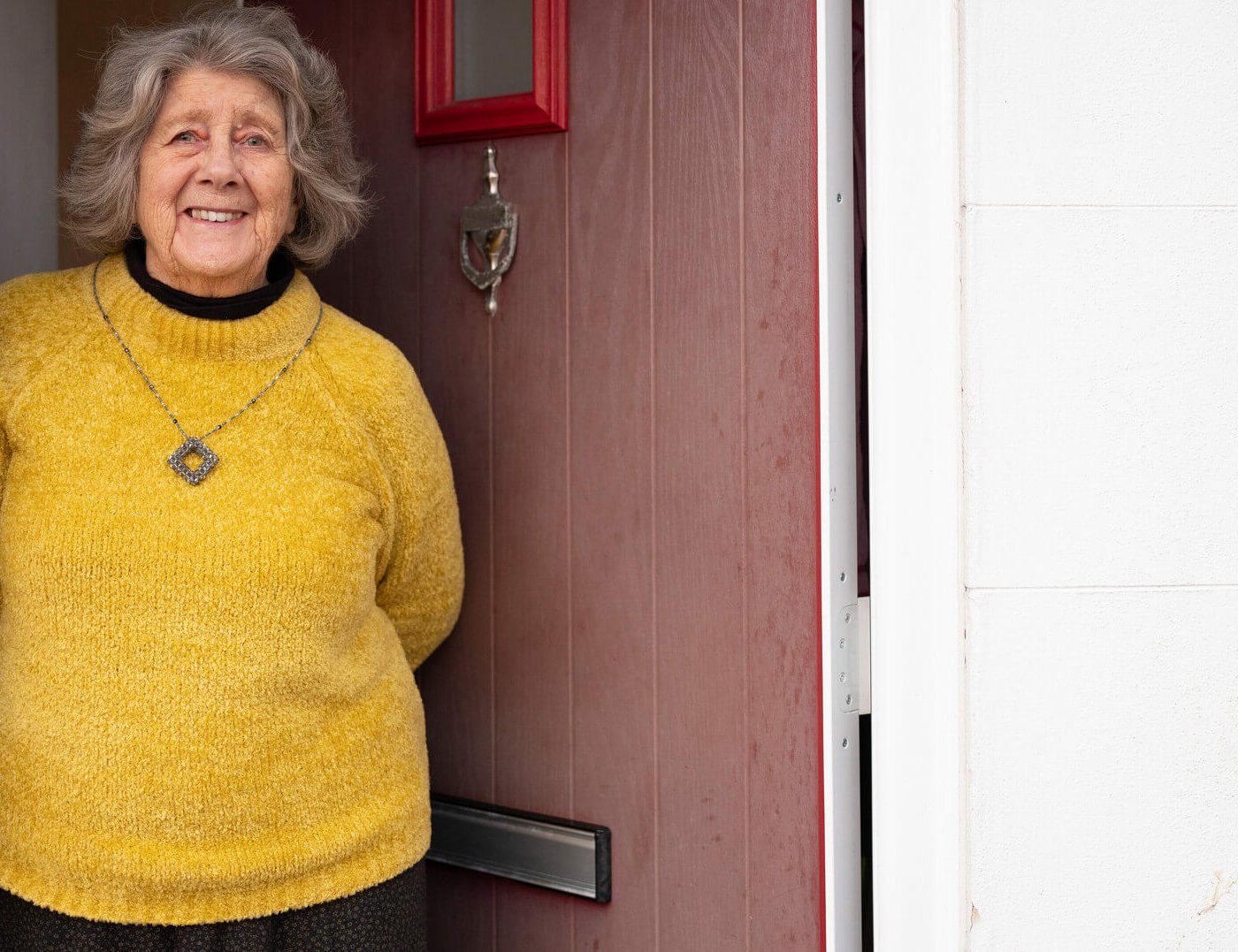
When you think of autumn, you may think of falling leaves, hearty food and cosying up indoors. However, this time of year can pose some challenges for older people.
Check heating is safe and efficient
Central heating
While the start of autumn can be fairly mild, now is a good time to think ahead and ensure the home is ready for when the temperature drops. Older people are more vulnerable to the effects of cold weather, and those living with a pre-existing health condition can be even more vulnerable. NHS guidance states that rooms that are in regular use, for example bedrooms and living rooms, should be heated to at least 18°C in colder months.
Why do older adults feel the cold more?
As we age our skin becomes thinner, and we lose some of the fat beneath the skin. This makes it harder to retain heat in the body. Our metabolic rate – the number of calories we need to function, decreases too. This can mean that some older people aren’t able to create enough body heat to stay at a healthy temperature.
After months of not being used, it’s important to check the home’s central heating system is working before your loved one really needs it. You can do this by –
- Turning the thermostat to 30° Centigrade
- Turning up the radiators up to 4 or 5 and leave on for 30 mins
- Checking that your boiler has come on and your radiators are warming up
If there’s an issue, it’s best to seek out the support of a certified gas engineer. Never attempt to fix a faulty boiler yourself.
Electric heaters
There are four main types of electric heater – fan heaters, oil heaters, halogen heaters and convector heaters. They’re usually used to heat up small areas i.e single rooms, very quickly. All electric heaters should be used with care, and never be left unattended or running overnight while you or your loved one’s asleep. If there’s an electric heater in the home, electricians recommend making everyone aware of the following –
- Always place them on a flat surface, away from furniture or combustible materials
- Never dry clothes on or near an electric heater
- Never leave them on overnight
- Never buy a second hand heater as it may be faulty
- Regularly check the heater for scorch marks or melted areas. Discontinue using it as the first sign of damage
- Sit at least 1 metre away from a heater
- Never attempt to repair a heater
Electric blankets
Old and faulty electric blankets alone account for over 5000 fires a year. People over 65 are more likely to have an electric blanket over 10 years old – electricians recommend replacing an electric blanket at least every 10 years.
If you or your loved one owns an electric blanket, the UK Fire Service has the following advice –
- Store the blanket correctly – avoid folding it as this can damage the wiring
- Don’t get it wet. If it does get wet don’t use it
- Disconnect the blanket from power before going to bed
- Regularly check for damage and discontinuing using it if you see any of the following –
- Fraying fabric
- Scorch marks
- Exposed elements
- Creasing or folding
- Damp patches
- Tie tapes damaged or missing
- Worn flex
- Loose connections.
You should arrange for a qualified electrician to safety test an electric blanket for you at least every three years.
If heaters or electric blankets have an old BEAB safety mark this means they are over 10 years old and will need replacing.
See if you're eligible for help with heating costs
Some older people worry about the cost of heating their home, and will avoid using central heating even in extremely cold weather to save money.
The UK government has a couple of heating schemes for the elderly to help with energy bills during colder months. However this year there has been major changes to the Winter Fuel Payments – a tax-free payment of up to £300 made to all pensioners to help with winter energy bills. The Government is now restricting this payment so that it’s only available to people on benefits and Pension Credit.
Scotland’s plan for their ‘Pension Age Winter Heating Payment’ which would replace the Winter Fuel Payment has been delayed until 2025, but will now also be means tested.
These changes mean it’s now more important than ever to check if you’re eligible for Pension Credit here.
What financial support is available?
If you’re worried about heating bills this winter, especially with the energy price cap likely to rise to 10%, there are some places to turn to for help –
- Keep an eye on the Warm Home Discount scheme for a one-off payment towards energy bills, which will be available in October
- Check if you or a loved one is eligible for help with home energy improvements
- Check if you or a loved one is eligible for the Cold Weather Payment in England and Wales, or the Winter Heating Payment in Scotland
Choose the right clothing
The NHS suggests wearing lots of thin layers, and choosing clothes made from cotton, wool or fleece material. This can help ‘trap in’ warmth, while making it easier to regulate temperature than just one bulky layer. If you’re going outside, a lot of heat is lost through the head and neck, so a hat and scarf is recommended.
Some clothes fastenings can be difficult for people with joint pain or restricted mobility. Choosing clothes with larger zip pulls or poppers may help, and some brands such as The Able Label specialises in accessible and adaptive clothing.
People with dementia can forget to dress appropriately when the temperature drops. Helping them may mean supporting them to make their own choices of warm clothing, and allowing them the time and space to dress themselves.
Looking for dementia care?
85% of us would want to stay in our own home if diagnosed with dementia. Elder makes this possible.
- We've helped thousands of families living with dementia
- We'll match you to self-employed carers with dementia experience
- We're part of Alzheimer's Society's Dementia Friends' initiative
Look out for fall risks
Fallen leaves and wet or icy pavements and paths are dangerous for everyone. However for older people who may be unsteady on their feet, and more prone to bone fractures they pose a serious risk. Older bones can also take longer to heal, and this recovery process can take its toll on both physical and mental wellbeing.
Take time to check handrails and ramps around the home are secure and haven’t become brittle or rusted. If you’re unable to clear leaves or grit paths outside the home yourself, a neighbour may be able to help. Alternatively sites like Trust a Trader or Taskrabbit can connect you to local handyman services or gardeners to suit all kinds of budgets.
Did you know we have many self-employed carers on our platform who enjoy gardening and can lend a hand keeping paths clear? Find carers in your local area today.
Get protected ahead of flu season
Contagious illnesses such as colds and flu are more common during colder times of the year, and are often more debilitating for older adults. Our immune systems become a little less effective as we age, so it can take longer to recover, and could develop into chest or sinus infections.
The best way to stay healthy is prevention. Everyone aged 65 and over can get a free flu vaccine from a GP or local pharmacy. Flu can be really unpleasant, so it’s a good idea to get the jab even if you or your loved one are generally fit and healthy. You can even get your seasonal flu jab while doing the weekly food shop, with Tesco and Asda now offering them at their larger stores.
Boost your immunity with the right foods
Good nutrition is important in winter. It can help the immune system, give us the energy we need, and keep us warm. Older people should aim to eat at least one hot meal a day, have regular hot drinks (ideally decaffeinated where possible). Including a good variety of foods can boost the amount of types of nutrients the body is getting.
You may find it helpful to stock your loved one’s cupboard or freezer with basic items or pre prepared meals in case it’s too cold to go shopping. Alternatively, a service like meals on wheels can ensure they’re regularly provided with a nutritious hot meal.
What foods are recommended in colder months?
We spoke to a Nutritionist from MyFood 24, who had the following advice for eating well in colder months –
- While we may be drawn to warming and comforting foods like casseroles and pies, these often include red and processed meats which should be eaten in moderation. Try switching to leaner cuts or white meat like turkey.
- During the colder and darker months we’re unable to get enough vitamin D from sunlight, which is integral to healthy skin and bones. Eating more oily fish, liver and fortified foods, or asking a GP about supplements can help boost vitamin D.
- Vitamin C can help with maintaining a healthy immune system. Foods like oranges, kale, spinach, broccoli and brussels sprouts are rich in vitamin C.
Keep track of medications
It’s also important to keep your and your loved ones home well stocked with everything they need to stay well and prevent infection. Ensuring prescriptions aren’t running low, and keeping plenty of tissues, hand sanitizers and antibacterial sprays around the home can bring peace of mind, especially if the weather turns and it’s not as easy to get out and about.
If you take regular medication, you may want to ask your GP about setting up repeat dispensing. This means you can pick up your medication directly from the pharmacy each time you need it, rather than ordering a repeat prescription from your GP first. Some pharmacies also offer a home delivery service to people who find it tricky to get out and about.
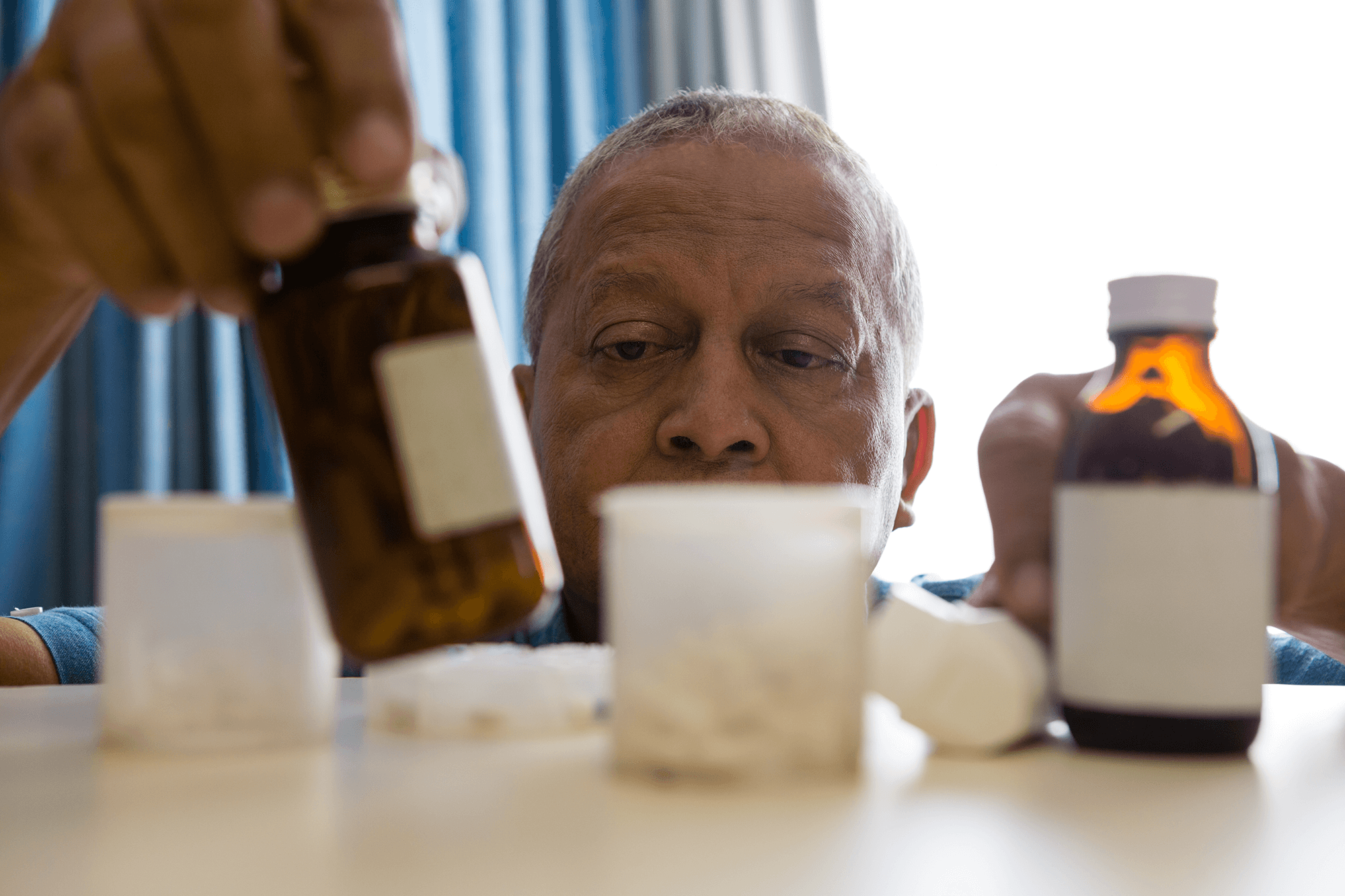
Be mindful of how you store your medicines
Cold weather can physically change your medication and affect how well it works.
Some medications are classed as ‘Ambient medication’ and need to be stored at room temperature (15°C to 25°C). Check the instructions on the label or packaging to understand how to properly store your medications. If you're worried your medication has been exposed to cold temperatures, or if it's looks different than usual, contact your local pharmacy for advice.
Don't skip health check-ups
Colder weather can also cause arthritis flare ups and make joint pain worse. Experts aren’t 100 percent sure why this happens, but it’s thought a drop in air pressure can cause joints to expand – leading to pain. Low temperatures can also thicken the natural shock-absorbing layer in the joints, which can make them stiff.
Making an effort to stay active can help keep joints comfortable and reduce the risk of accidents. Even gentle chair based exercises can support mobility and balance. Age UK has a wide range of exercises on their website, remember, it’s best to consult a doctor before trying a new exercise.
It’s also a good idea to organise an eye test at this time of year too, as with shorter days comes lower visibility. If you or your loved one drives, they may want to consider using public transport or taxis when travelling in dark or rainy conditions.
Watch out for signs of loneliness
3.6 million people over the age of 75 live alone, and when the weather gets colder, wetter and generally a bit more miserable, leaving the house can become more difficult. This increases their risk of feeling isolated from friends and loved ones.
Signs a loved one may be feeling lonely include spending more time in bed, changes in mood – such as being despondent or snappy, or changes in their daily behaviour, such as spending more money on things they don’t need. You can find out more about loneliness here.
Small acts of companionship make a big difference – from a cup or tea and a chat or a weekly phone call, to dropping off some shopping or sharing a meal.
Befriending services can help too – connecting older people to volunteer companions either over the phone, or in person. You can find out more in our guide here.
Looking for a helping hand?
Read our latest blogs
Browse the latest blogs and tips on living well in later life.
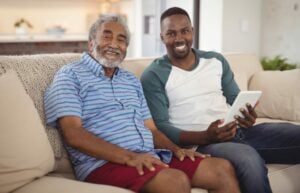
8 tips for if you’re caring from a distance
Ensuring an older loved one is safe a cared for when you don’t live nearby can be challenging. However, while you can’t just pop in
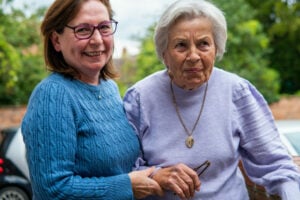
Feeling trapped caring for an elderly parent
No matter how much you love a parent, shifting from being their child to their caregiver can be incredibly difficult. It’s common to feel ‘trapped’

Elderly nutrition: cooking & meal preparation for the elderly
Elderly nutrition: cooking & meal preparation for the elderly Healthy eating should always be a priority, but as we age, our nutritional needs change as
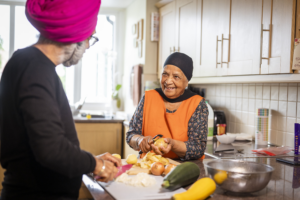
What domestic tasks will a home carer look after?
What domestic tasks will a home carer look after? Live-in carers are at the heart of our comprehensive approach to round-the-clock home care. Care isn’t
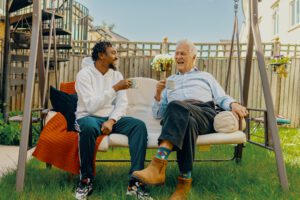
Live-in care or visiting care – which is right for me?
Choosing the right home care is a big decision, and it can be a difficult one too. There are a lot of home care services
